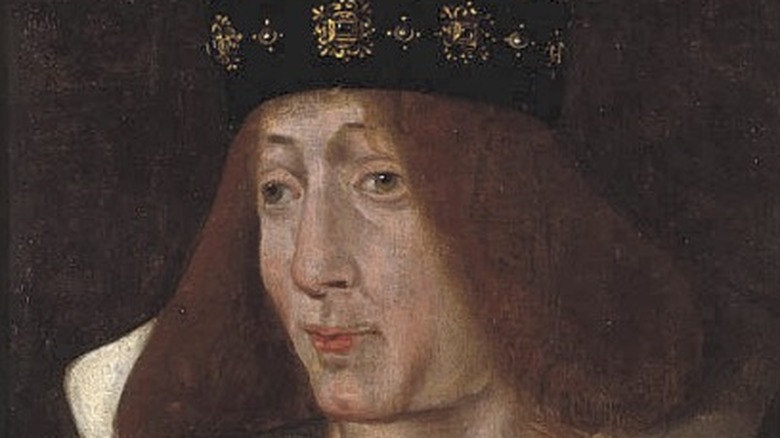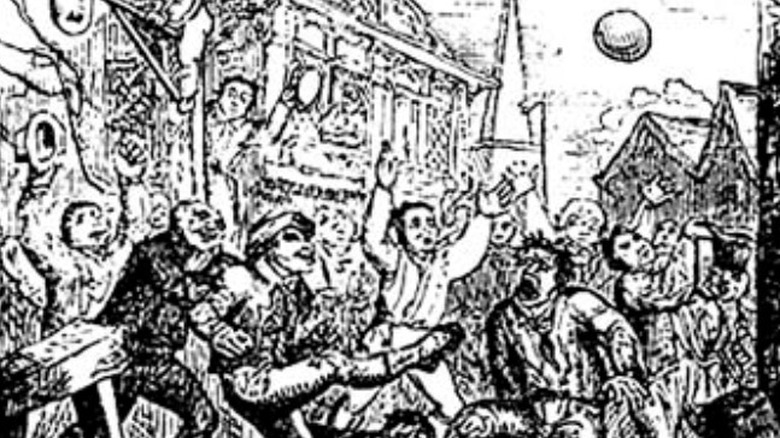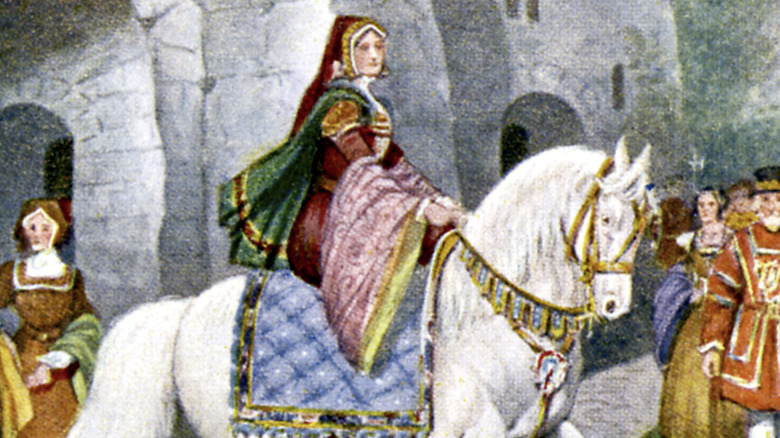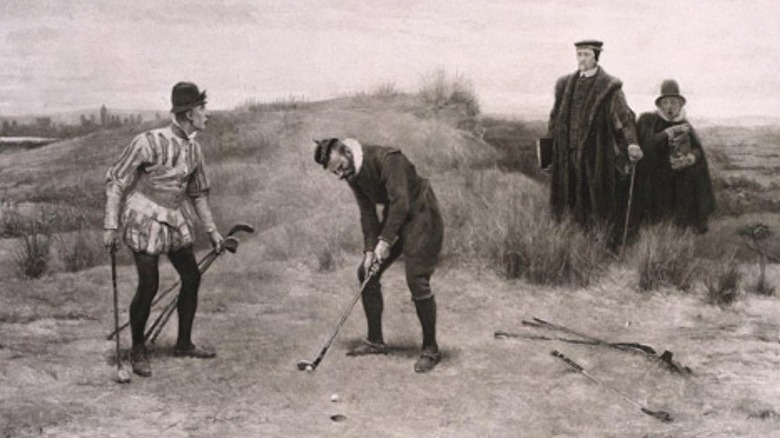Golf Was Once Banned In Scotland For One Big Reason
Scotland is famous for being the land where golf began, and this is a legacy that the country has embraced today (via Scotland). It has more than 550 courses and frequently hosts important tournament,s like the Open Championship and the Women's British Open, according to Visit Scotland. The first golf match between the U.S. and Great Britain was held there in 1921, paving the way for the Ryder Cup, according to Scotland. Famous golfers continue to prefer Scottish courses. Jack Nicklaus once said, "When the Open is in Scotland, there's really something special about it."
Given the extent to which Scotland has now embraced golf, it might surprise you to know that the first time the country mentioned the sport in its written record was to ban it (via Keiser University, College of Golf). That's right: Golf's first appearance in the written record came in a 1457 Act of Scottish Parliament prohibiting the sport.
Trouble with a capitol G
Today, golf is considered one of the more sedate sports, but that was not the case when it first emerged. In 15th century Scotland, every man over the age of 12 was supposed to engage in military training, according to Golf in Scotland. This was because the country was constantly at risk from being invaded. Further, the monarchy was relatively weak compared to the nobility. However, there was trouble distracting the youth of Scotland, with a capital T and that rhymes with G and that stands for golf.
Instead of practicing archery or other skills that would help them defend the homeland, young men were more interested in playing golf, as well as football. Even worse, they would play the games in churchyards, streets, or other confined, public spaces. To put a stop to this, an Act of Parliament was passed by James II on March 6, 1457, setting the nation's priorities for physical activity, according to The Scotsman. "Item, it is ordained and the decreed that the lords and barons both spiritual and temporal should organise archery displays four times in the year. And that football and golf should be utterly condemned and stopped," the Act read. Further, the legislation stipulated that archery targets should be set up in churches every Sunday for practice. Anyone found playing golf or football instead would be punished by local barons or the king's officers.
Origins of the ban
The ban on golf grew out of an earlier ban on football, or "futball," which at the time was defined as any sport that wasn't played while riding horses, according to The Scotsman. King James I was the first Scottish monarch to approve a ban on football when he signed a statue in 1424. "[N]a man play at the Fute-ball," he declared, according to The Guardian. Anyone caught violating the statute would have to pay a fine of four pence, according to The Scotsman.
Scotland wasn't the only place to ban football. England had banned it a century before, though it was a much wilder game than what the U.S. calls soccer today, according to The Guardian. It involved trading a ball back and forth between two entire villages. "For as much as there is great noise in the city, caused by hustling over large balls from which many evils might arise which God forbid, we command and forbid ... such game to be used in the city in the future," King Edward II of England decreed. English monarchs Edward III, Richard II, Henry IV, and Henry V all also restricted it for a similar reason as their Scottish counterparts: It distracted from archery practice during the Hundred Years' War. However, the people of England and Scotland had something in common: They loved their ground sports more than they feared punishment. So Scotland had to pass the 1457 Act and ban golf as well.
Future prohibitions
Despite the 1457 ban, the Scottish people continued to play golf. At least that's what can be assumed from the fact that more bans on the sport were passed in 1471 and 1491 by James III and James IV (above), according to Golf Digest. The 1471 Act again said that football and golf should be "abandoned" in favor of archery, and mandated once again that targets be put in place to facilitate the latter (via Golf in Scotland).The 1491 Act had even harsher language. It ordered "that no part of the country should football, golf, or other such pointless sports be practised." "Pointless" in this case was a bit of an unintentional pun, since the Act once again called for archery targets to be set up in each parish. Violations could be punished with a fine of 40 shillings.
The final 1491 ban also displayed a bit of hypocrisy on the part of King James IV, since he was known to enjoy playing both golf and football himself, according to The Scotsman. In 1502, the king had hand-made clubs purchased for him in Perth, according to Golf in Scotland. The receipt is therefore the first written record of a legal golf game, according to The Scotsman. The king commissioned the clubs from a bowmaker and probably played a game in a location close to Perth called North Inch.
Play golf, not war
Around the time that King James IV bought his golf clubs, the urgency of archery training faded. The year 1502 was also the year that Scotland signed the Treaty of Glasgow — or the Treaty of Perpetual Peace — with Henry VII of England, according to Golf Digest. This treaty was meant to end more than 170 years of fighting between the two neighboring countries, according to the National Records of Scotland. That peace was partly solidified by a marriage between King James IV and Henry VII's daughter, Margaret Tudor. "Keeping in view the bond and amity, truce, friendship and alliance which presently exists between our most illustrious princes ... and also the marriage to be contracted before Candlemas next, we will ... that there be a true, sincere, whole and unbroken peace, friendship, league and alliance ... from this day forth in all times to come, between them and their heirs and lawful successors," the treaty text read in part (via Scottish Archives for Schools).
The two monarchs tried to tie themselves to their word by agreeing with Pope Alexander V that violating the treaty would lead to excommunication. Despite this, the "perpetual peace" only lasted 11 years. In 1513, Scotland came to the aid of the French in the Battle of Flodden, according to the BBC. Scotland lost the battle, and King James IV lost his life. Even when hostilities resumed, however, the growing use of gunpowder lessened the need for archery drills, according to The Scotsman.
The Sabbath Breakers
As archery declined in importance for military training, new concerns about golf emerged, according to The Scotsman. Mostly, authorities were worried about people playing golf on Sundays when they should be in church. There is a document from 1604 that shows what happened when six boys were caught playing golf on the Lord's day, according to Golf in Scotland. The incident is recorded in a book of Church of Scotland session minutes from Perth. The minutes tell of "Robert Robertson, William Stenis, Andrew Donaldson, Alexander Niving, Adam Paul, Robert Meling, all warned to this Day, who were convicted of profaning the Lord's Sabbath by absenting themselves from hearing of the Word, & playing at the Gowf in Time of Preaching." Robertson, the leader, had to pay a fine, and all of them had to repent in public.
Even as the game developed, a stigma persisted. The 1896 painting "The Sabbath Breakers" by J. C. Dollman (above) shows two young men caught red-handed playing golf by disappointed clergy members (via Golf in Scotland). However, golf had also become a fashionable pastime. In 1636, the first description of the game was included in a Latin vocabulary book written by a schoolteacher (via Golf in Scotland). The first book entirely about golf was published in 1743 and described a golf game between a lawyer and a bookseller (via Golf in Scotland). Even so, the bans on golf and football weren't technically lifted until 1906, according to The Scotsman.





